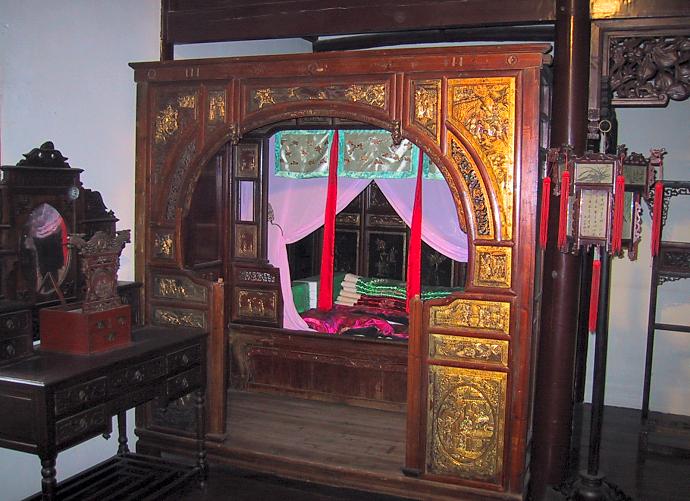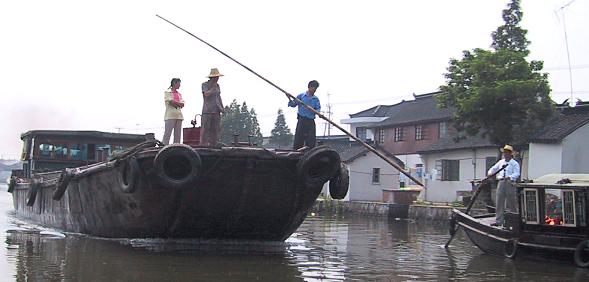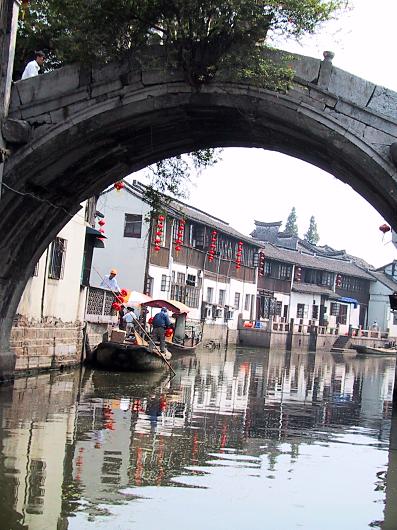
Zhu Jiajiao calls itself the "East Venice". Quite a few Chinese towns in this area do likewise. We were originally headed somewhere else today but the bus tickets were sold out. This turned out to be a great substitute.
Entrance to the city is by a foot bridge. There's a woman on the right
selling...

Fish! Maggie buys three for one yuan. (And I 'm wondering why...)

A snack? No...

You buy the fish in order to...

Set them free!

Maggie did the first and left two for me. Maggie had just explained some
buddhist beliefs to me that morning on the train. The short summary is that
you should do good things for all living creatures. Also, because the Buddhists
believe "cause and effect" (preordained fate). If you do good things, you
must have good effect in the future.

We ate lunch under the umbrellas.

The barber shop.

Some small restaurants.



Maggie and I had a cruise on one one of these boats after lunch.


A public toilet. (The gray cube in the center.) Kind of short but a big step
up from the previous one which was just a small pot in an alley.

Student artists at work.

I was taking pictures of the boats but Maggie pointed out that I had also
taken a picture of a funeral on the other bank.

Maggie takes me on a tour of the alleys.

A yard.


A peek in someone's kitchen.

This is the god of money which is attached to some doors. Basically this
lets the god know that you wouldn't mind having some.

Preserved eggs being made. Maggie says they're coated in dirt and a "secret
ingredient". I said that we were told in Beijing that the secret ingredient
was horse urine. Maggie said it wasn't but then she couldn't tell me what
it was. (But she told me that those shrimp were going to be dead when they
arrived at the table too - see the food page.)

The following pictures were taken in the house of Ma Wenqing, a government official of the Qing dynasty.

You can tell I like the tile roofs can't you?


A bed.

Bedroom furniture. The lantern is lit by a candle.

Another bed

We found this bell and a hammer nearby so we assumed we were expected to
ring it.


Some of the official's suits of armor and flags

This was rather strange. Maggie inserted a coin into something called a "slot
stove". I was thinking: slot stove? Is this some historical thing? Were ancient
chinese stoves coin-operated?...

... and it produced steam for about 20 seconds. An amusement park gadget
in a historical home.

But this is much better. Maggie demonstrates how to use old rice grinders.
(Authentic devices - no coins required.)

Maggie's grandmother had this style when Maggie was a child.

It takes some work.

Here's the super-size model.



Maggie explained that you write a wish on these ribbons and then tie them
as high up on the tree as you can and hopefully they will come true. The
first one she read was a wish for money.



A closeup on a palm tree.



A nice balcony above

With me sitting on it.

Ceremonial head gear for the man (left) and woman. The projections on the
man's indicates an official position.

Maggie orders us a snack before lunch - a cold sweet rice and bean soup and
a couple of eggs.

Many of the people here lived on their boats.

After lunch we went on a boat ride of our own. I needed a wider lens to get
the oarsman's head in :-)

This is the bridge where we set the fish free this morning. During the Song
Dynasty, many canals where built to enable commerce throughout China. The
canals were obstacles to foot traffic which caused the Song engineers to
become master bridge builders. Some bridge innovations took more than 1000
years to show up in western countries.

We ate lunch under the umbrellas at the left. Included in the lunch was many
small fish. I asked Maggie what if the fish we are eating are the ones we
set free. Maggie said they would still owe use because the restaurant killed
them. Then I asked: what if they were served live? Maggie agreed that this
was an interesting question.

I don't know why they are skimming.

We're cruising down such a narrow canal here that you can't tell that Maggie
is in a boat.

A near-miss.


A construction worker returning to his boat to pick up more cement.


More student artists.




The furthest woman had been staring incessantly until I pulled out my camera
:-)


A carving that I liked on a local temple wall.


Local gods. We got yelled at for taking this.

The people here write their water and electricity meter readings on their
doors so the meter readers don't have to come inside.

Another famous person's home.
A ceremonial vehicle.


This furniture looked like Danish modern to me so I asked Maggie if this
house was recent and she agreed that it was.

Then I saw that the owner of this house lived from 1724 to 1806 and I realized
that Chinese people have longer ideas of "recent" then I do.

Some roof work.
